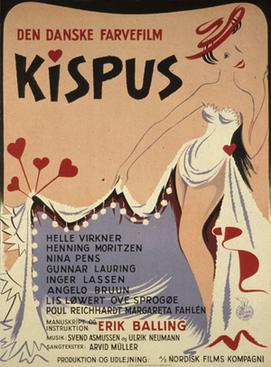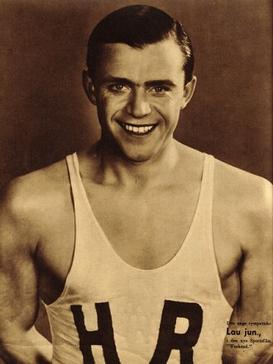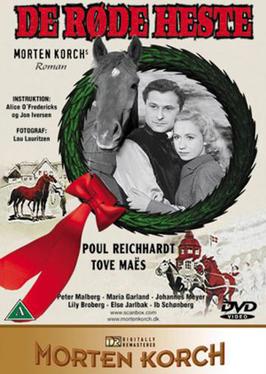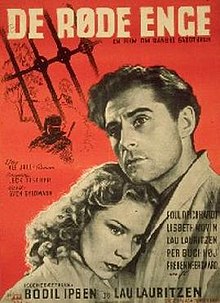
The Danish resistance movements were an underground insurgency to resist the German occupation of Denmark during World War II. Due to the initially lenient arrangements, in which the Nazi occupation authority allowed the democratic government to stay in power, the resistance movement was slower to develop effective tactics on a wide scale than in some other countries.

Poul David Reichhardt was a Danish actor, well known for his roles in Danish 1940s/1950s comedies. Later on, he also played more serious and varied roles; he has also starred in Huset på Christianshavn, Matador and as various minor characters in the Olsen-banden films.

Bodil Ipsen was a Danish actress and film director, and is considered one of the great stars of Danish cinematic history. Her acting career, which began in theater and silent films, was marked by leading roles in large folk comedies and melodramas. However, it was as a director that she was most influential: directing the first Danish film noir and making several dark psychological thrillers during the 1940s and 1950s. Ipsen's name along with that of Bodil Kjer is given to Denmark's most celebrated film prize, the Bodil Award.
Lisbeth Movin was a Danish actress of stage and film best known for her role as Anne, the pastor's wife accused of witchcraft in the film Day of Wrath (1943) directed by Carl Theodor Dreyer. She also appeared as the widow in the screen adaptation of Babette's Feast (1987), directed by Gabriel Axel. She was the mother of actress Lone Lau.

Café Paradis is a 1950 Danish film, directed by Bodil Ipsen and Lau Lauritzen Jr., and written by Johannes Allen. The film received the Bodil Award for Best Danish Film, and Ib Schønberg, for what is regarded his finest performance, received the Bodil Award for Best Supporting Actor.

Det Sande Ansigt is a 1951 Danish film directed by Bodil Ipsen and Lau Lauritzen Jr., written by Johannes Allen, and based upon the novel by Gerhard Rasmussen. The film received the Bodil Award for Best Danish Film of the Year.

Kispus is a 1956 Danish romantic comedy film written and directed by Erik Balling. The film was the first Danish feature movie to be filmed in colour.

The Viking Watch of the Danish Seaman is a 1948 Danish war drama directed by Bodil Ipsen and Lau Lauritzen Jr. The film, known alternatively as Perilous Expedition or its literal title translation Steady stands the Danish sailor, written by Grete Frische based upon the wartime diary of Kaj Frische, tells the true story of Danish sailors who sailed with the Allied forces during the German occupation of Denmark in World War II. It stars Poul Reichhardt and Lisbeth Movin. The film received the Bodil Award for Best Danish Film in 1949.

Lau Lauritzen Jr., was a Danish actor, screenwriter, and film director. As a director, he was a 4-time recipient of the Bodil Award for Best Danish Film. Lauritzen co-founded the Danish film studio ASA Film and served as the studio's artistic director (1937–1945) and administrative director (1945–1964).

Johnny Farlig is a 1953 Danish crime drama directed by Lau Lauritzen Jr. and starring Ib Mossin and Birgitte Bruun. The film tells the dark story about a naive youth being drawn into a life of petty crime and unable to break away. The film received the Bodil Award for Best Danish Film in 1954.

The Red Horses,, is a 1950 Danish romantic drama directed by Alice O'Fredericks and Jon Iversen, based on the popular novel by Morten Korch. The film stars Poul Reichhardt and Tove Maës as young newlyweds who try to save an old family farm by winning a horse race. The Red Horses is the most watched Danish film of all time.
Lise kommer til Byen is a 1947 Danish family film directed by Lau Lauritzen Jr. and Alice O'Fredericks.
Me and My Kid Brother and Doggie is a 1969 Danish comedy film directed by Lau Lauritzen Jr. and Lisbeth Movin and starring Dirch Passer.
The Invisible Army is a 1945 Danish war film directed by Johan Jacobsen and starring Bodil Kjer.
En sømand går i land is a 1954 Danish comedy film directed by Lau Lauritzen Jr. and starring Poul Reichhardt.
Taxa K 1640 efterlyses is a 1956 Danish drama film directed by Lau Lauritzen Jr. and starring Poul Reichhardt.
Rikki og mændene is a 1962 Danish drama film directed by Lau Lauritzen Jr. and Lisbeth Movin and starring Ghita Nørby.

Hagbard and Signe or The Red Mantle is a 1967 internationally co-produced drama film based on the story of Hagbard and Signy from the twelfth-century work Gesta Danorum by Saxo Grammaticus, directed by Gabriel Axel and starring Gitte Hænning. The film won a Technical Prize at the 1967 Cannes Film Festival.
The 2nd Bodil Awards ceremony was held on 29 April 1949 at Palace Hotel's night club Ambassadeur in Copenhagen, Denmark, honouring the best national and foreign films of 1938. Ib Schønberg acted as host and Lily Broberg, Poul Reichhardt and Grethe Thordahl performed at the event which was attended by 300 guests.











